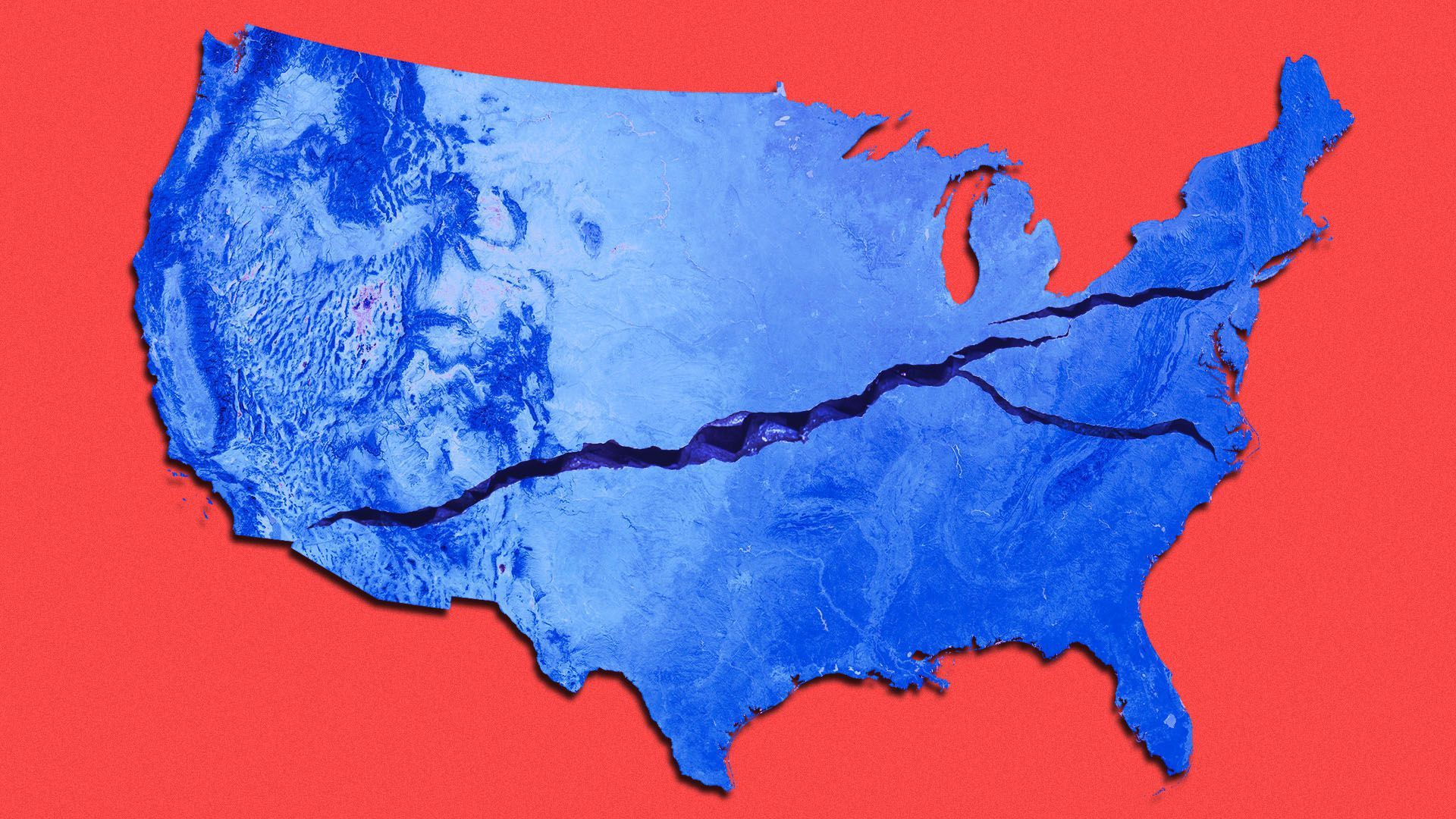Foreign, domestic disinformation deepens U.S. fissures
Add Axios as your preferred source to
see more of our stories on Google.

Illustration: Sarah Grillo/Axios
American democracy faces what could be its greatest test in a lifetime as signs mount that Russia is working to interfere in the 2020 U.S. presidential election, while the Trump administration and its allies systematically minimize those efforts, in the process becoming an accessory to them.
Why it matters: It's becoming ever more difficult to find any boundary between foreign meddling and domestic disinformation.
The big picture: As journalist David Halberstam once observed of the McCarthyist convulsions of the 1950s, "If the center did not fold, it did not exactly hold, either." As the president and his proxies invent monsters to destroy, while declaring that real monsters are imaginary, the center of the American polity faces unprecedented strain from within and without.
Driving the news: Just last week...
Microsoft announced that hackers linked to Russia as well as China and Iran were attempting to infiltrate political organizations including both the Trump and Biden campaigns.
- It's unclear whether these campaigns are "mere" spying attempts or preludes to a 2016-style hack-and-dump campaign seeking to alter the American political dynamic.
A whistleblower told House lawmakers that, while working as the top intelligence official in the Department of Homeland Security, acting agency chief Chad Wolf told him "to cease providing intelligence assessments on the threat of Russian interference in the United States, and instead start reporting on interference activities by China and Iran."
- Wolf, according to the whistleblower, was working on orders from national security adviser Robert O’Brien.
The Treasury Department sanctioned Andrii Derkach, a Ukrainian parliamentarian and active Russian agent.
- The move was a belated official acknowledgment that Derkach’s campaign to smear Joe Biden is in essence a Russia-backed disinformation operation.
- Not mentioned by Treasury: Trump lawyer and confidante Rudy Giuliani pushed material from Derkach.
- The Derkach operation has also received the imprimatur of legitimacy from Senate Homeland Security Committee Chair Ron Johnson (R-Wis.), whose investigation into Biden is built in part around Derkach-provided material.
Microsoft’s disclosures make clear that Chinese and Iranian cyber spies are also targeting U.S. politicians and political operatives.
- Top U.S. intelligence officials have said that both Beijing and Tehran are seeking to influence the 2020 election, and they prefer that former Vice President Biden is victorious in November.
Yes, but: Only Russia has a demonstrated record of taking the momentous step beyond cyber spying to actually using pilfered political data in service of covert action: hacking, then leaking material strategically to sow chaos in the U.S. and tip the scales toward its preferred candidate.
And unlike in 2016, the levers of federal power are being used to stamp out public disclosures on the subject.
- As willing, powerful U.S. political figures circulate material from interference campaigns while also downplaying the threat they pose, the line between foreign and domestic disinformation is blurring, and perhaps eroding entirely.
- There is no intelligence or national security solution to what has become, in essence, an acute domestic political crisis.
Be smart: Leaders in Moscow can watch CNN or read the Washington Post and interpret the administration’s timorous response to Russian active measures clearly as tacit encouragement — or at least implicit tolerance.
What's next: A close election in November will likely be contested, and ballot counting could drag on for weeks; legal challenges, for months.
- Foreign intelligence services may rush into the void, seeking to exacerbate political tensions and weaken the United States.
- Domestic politicians, including the president himself, will likely sow fear, uncertainty and doubt about the results, perhaps amplifying disinformation created by foreign actors. Other levers of state power can be used for the same ends.
- Massive street protests, and other forms of nonviolent and even violent extra-parliamentary politics, may become widespread.
The bottom line: America is in a vulnerable place, and we simply don’t know what might push the wobbling center toward collapse.
